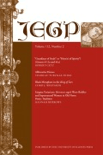
JOURNAL OF ENGLISH AND GERMANIC PHILOLOGY
Scope & Guideline
Bridging Cultures Through Language and Literature
Introduction
Aims and Scopes
- Medieval Literature Analysis:
The journal extensively covers medieval literary texts, exploring their historical contexts, narrative structures, and thematic concerns. - Cultural Interactions and Influences:
It examines the cultural exchanges between different medieval societies, particularly the interactions between English and Germanic cultures. - Linguistic Studies:
The journal includes studies on the evolution of language, dialects, and linguistic features in medieval texts, contributing to a deeper understanding of Germanic linguistics. - Gender and Identity in Literature:
A focus on how medieval literature reflects and constructs notions of gender, identity, and societal roles, providing critical insights into the cultural norms of the time. - Religious and Mythological Themes:
The journal engages with the religious and mythological underpinnings of medieval texts, analyzing their impacts on literature and culture. - Textual Criticism and Manuscript Studies:
It contributes to the field of textual criticism, offering new insights into manuscript traditions and the transmission of texts across generations.
Trending and Emerging
- Interdisciplinary Approaches:
There is a growing trend towards interdisciplinary research that combines literary analysis with insights from history, sociology, and cultural studies. - Environmental and Material Culture Studies:
Emerging themes include a focus on environmental contexts and material culture, exploring how landscapes and objects influence medieval narratives. - Digital Humanities and Textual Studies:
The integration of digital humanities methods into textual studies is becoming increasingly prominent, as scholars utilize technology to analyze and interpret medieval texts. - Critical Gender Studies:
A significant increase in research related to gender studies, exploring how medieval texts engage with concepts of masculinity, femininity, and queer identities. - Ethical and Moral Dimensions:
Emerging discussions concerning the ethical implications and moral dimensions presented in medieval literature, particularly in relation to contemporary issues.
Declining or Waning
- Traditional Historical Narratives:
There appears to be a waning interest in purely historical studies that do not engage with the literary or cultural implications of medieval texts. - Exclusively Nationalistic Perspectives:
Research that focuses solely on nationalistic interpretations of medieval literature is declining, as there is a shift towards more global and interconnected analyses. - Old Norse Literature in Isolation:
The focus on Old Norse literature without considering its broader European context has diminished, reflecting a trend towards comprehensive interdisciplinary approaches. - Simplistic Textual Analyses:
The journal is moving away from overly simplistic analyses that do not account for the complexities of medieval texts and their multifaceted interpretations.
Similar Journals
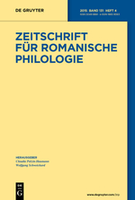
ZEITSCHRIFT FUR ROMANISCHE PHILOLOGIE
Advancing Scholarship in Linguistics and Literary TheoryZEITSCHRIFT FUR ROMANISCHE PHILOLOGIE, published by Walter de Gruyter GmbH, stands as a prominent peer-reviewed journal dedicated to the fields of Linguistics, Literature, and Literary Theory. Established in 1877 and continuing its legacy to the present day, this esteemed journal offers a platform for comprehensive scholarship that explores the intricacies of Romance languages and their literary heritage. With a notable Q1 ranking in Literature and Literary Theory and a Q2 ranking in Linguistics and Language, it has secured its place among leading resources in the humanities. Researchers, educators, and students benefit from its rich historical context and current contributions to the understanding of Romance languages and literature. Though currently not available as Open Access, the journal prioritizes the dissemination of high-quality research, making significant strides in fostering academic dialogue and advancement. Its address at Genthiner Straße 13, Berlin, Germany, situates it in a hub of scholarly activity, bridging the past with contemporary literary discourse.
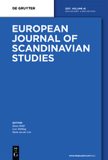
European Journal of Scandinavian Studies
Illuminating linguistic diversity and literary depth.European Journal of Scandinavian Studies is an esteemed journal published by Walter de Gruyter GmbH, dedicated to advancing scholarship in the fields of Cultural Studies, Linguistics and Language, and Literature and Literary Theory. Since its inception in 2010, the journal has been a pivotal platform for researchers and scholars, showcasing cutting-edge research and critical discussions pertaining to Scandinavian languages and cultures. With an ISSN of 2191-9399 and an E-ISSN of 2191-9402, the journal emphasizes accessibility to impactful academic work, despite its current non-open access model. While the journal is categorized within the Q4 quartile for Cultural Studies and Linguistics/Language, it has shown notable potential in ranking higher in its specialized domains, fostering a growing community of researchers invested in Scandinavian studies. The journal's office is located in Berlin, Germany, further enriching its European scholarly context. As it continues to evolve, the European Journal of Scandinavian Studies serves as a vital resource for academics seeking to engage deeply with the multifaceted aspects of Scandinavian culture and linguistics.
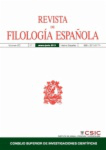
REVISTA DE FILOLOGIA ESPANOLA
Connecting Scholars Through Open Access ResearchREVISTA DE FILOLOGIA ESPANOLA is a distinguished academic journal dedicated to the fields of linguistics and literature, published by the CONSEJO SUPERIOR INVESTIGACIONES CIENTIFICAS (CSIC) since 1954, and has been an Open Access journal since its inception. Situated in Madrid, Spain, this journal has emerged as a crucial platform for the dissemination of scholarly research, with notable rankings including Q2 in Linguistics and Language and Q1 in Literature and Literary Theory as of 2023. The journal's commitment to fostering academic dialogue is reflected in its impressive Scopus rankings, including a 79th percentile in the Arts and Humanities for Literature and Literary Theory. Covering a wide range of topics from linguistic theory to literary critique, REVISTA DE FILOLOGIA ESPANOLA is essential reading for researchers, professionals, and students alike, providing valuable insights and cutting-edge research in the ever-evolving landscape of Spanish philology.
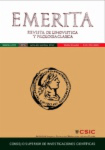
Emerita
Illuminating the Richness of Classical Studies and LinguisticsEmerita is a distinguished academic journal published by CONSEJO SUPERIOR INVESTIGACIONES CIENTIFICAS-CSIC in Spain, focusing on the fields of Classics and Linguistics. With its roots dating back to 1971, Emerita has established itself as an open-access publication since 1974, ensuring broad accessibility for researchers, professionals, and students alike. This journal's commitment to scholarly excellence is reflected in its 2023 Q2 classification in Classics and Q3 in Linguistics and Language, making it a vital resource for those engaged in classical studies and language research. In the Scopus rankings, it holds respectable standings, including Rank #76/170 in Arts and Humanities Classics and Rank #695/1088 in Language and Linguistics, demonstrating its significant presence and influence within these academic disciplines. The editorial office is located at Editorial CSIC, C/VITRUVIO 8, 28006 MADRID, SPAIN, where it continues to curate important research that contributes to the understanding and appreciation of classical literature and linguistic theory.

Journal of Comparative Germanic Linguistics
Unveiling the Nuances of Germanic Language StudiesThe Journal of Comparative Germanic Linguistics, published by SPRINGER, is a leading peer-reviewed academic journal that has significantly contributed to the fields of linguistics and arts and humanities since its inception. With an impressive impact factor and consistently ranked in the Q1 category in both Arts and Humanities (miscellaneous) and Linguistics and Language, this journal serves as a vital platform for scholars to disseminate their research on comparative studies in Germanic languages. The journal's scope encompasses a broad range of topics, fostering an interdisciplinary dialogue that enhances our understanding of language development, structure, and evolution. Although currently not an open-access journal, the Journal of Comparative Germanic Linguistics ensures that its high-quality articles reach a global audience, appealing to researchers, professionals, and students who are keen to explore the nuances of Germanic linguistics. With its strategic address in the Netherlands, the journal stands at the forefront of linguistic research, providing valuable insights that contribute to the academic community's knowledge base.

Slavia-Casopis pro Slovanskou Filologii
Connecting Cultures through Slavic Language and LiteratureSlavia-Casopis pro Slovanskou Filologii is an esteemed journal dedicated to the advancement of Slavic philology, published by the SLOVANSKY USTAV AKAD CESKE REPUBLIKY in the heart of the Czech Republic. With its ISSN: 0037-6736, the journal serves as a vital platform for scholarly exchange, embracing a rich academic tradition since its convergence years beginning in 2002. The journal has achieved notable recognition, with a Q3 ranking in Linguistics and Language and a Q2 in Literature and Literary Theory as of 2023, highlighting its contribution to these dynamic fields. Although it does not currently offer open access, its rigorous selection of articles ensures that it remains a crucial resource for researchers and practitioners alike, facilitating a deeper understanding of Slavic languages and literature. Scholars benefit from the journal's extensive research backdrop, enhanced by its current ranks in the Scopus database, underscoring its significant placement within the academic literature landscape. The editorial scope of Slavia promotes innovative inquiries that reflect cultural, historical, and theoretical perspectives endemic to Slavic studies, making it indispensable for professionals, students, and enthusiasts invested in the exploration of Slavic linguistic and literary heritage.

Alicante Journal of English Studies-Revista Alicantina de Estudios Ingleses
Pioneering Research in English StudiesAlicante Journal of English Studies - Revista Alicantina de Estudios Ingleses, published by the esteemed University of Alicante since 2003, is a vital platform for researchers and scholars in the fields of Cultural Studies, Linguistics and Language, and Literature and Literary Theory. With an impressive impact factor reflected by its Q1 and Q2 rankings across various categories in 2023, the journal consistently delivers high-quality peer-reviewed articles that push the boundaries of knowledge and discourse in English studies. Operating under an Open Access model, it ensures that research is freely accessible to a global audience, thereby fostering collaboration and advancement within the academic community. The journal's commitment to excellence is further underscored by its Scopus rankings, which place it in the top percentiles of literature and cultural studies. Its scope for the converged years from 2019 to 2024 promises continued relevance and innovation, making it an essential resource for professionals, researchers, and students alike who seek to deepen their understanding of English studies.

Magnificat Cultura i Literatura Medievals
Advancing Knowledge in Medieval StudiesMagnificat Cultura i Literatura Medievals, published by UNIV VALENCIA, SERVICIO PUBLICACIONS, is an esteemed academic journal that has been at the forefront of medieval studies since its inception in 2014. With its Open Access model, this journal ensures that cutting-edge research is readily available to scholars and enthusiasts alike, fostering an inclusive academic environment. Based in Spain, it boasts impressive rankings with a Q2 designation in History and a Q1 in Literature and Literary Theory for 2023, indicating its significant contribution to these fields. The journal is indexed by Scopus, achieving top-tier rankings in both Literature and History, and is recognized in the 87th and 72nd percentiles of their respective categories. With a focus on the complexities of medieval culture and literature, Magnificat serves as a vital resource for researchers, professionals, and students dedicated to exploring the rich tapestry of medieval scholarship.

Sibirskii Filologicheskii Zhurnal
Illuminating the Depths of Language and Literary TheorySibirskii Filologicheskii Zhurnal is a prestigious academic journal published by the Russian Academy of Sciences, Institute of Cytology and Genetics. With ISSN 1813-7083, it is dedicated to advancing research in the fields of Cultural Studies, Linguistics and Language, and Literature and Literary Theory, and has achieved notable rankings, including Q2 in Cultural Studies and Linguistics, and Q1 in Literature for 2023. The journal provides a platform for scholarly discourse, contributing valuable insights to its fields with an evolving scope that spans from 2018 to 2024. Though not an open-access journal, Sibirskii Filologicheskii Zhurnal serves as a vital resource for researchers, professionals, and students in the Russian Federation and beyond, fostering a deeper understanding of linguistic and literary phenomena. Its commitment to high-quality content makes it an essential addition to any academic's library.
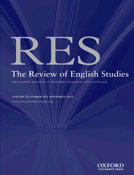
REVIEW OF ENGLISH STUDIES
Charting New Territories in English Literature and LanguageREVIEW OF ENGLISH STUDIES, published by Oxford University Press, is a prestigious journal that has been advancing the fields of Literature and Literary Theory as well as Linguistics and Language since its inception in 1925. With an impressive impact factor and a commendable ranking, placing it in the Q1 and Q2 categories across relevant disciplines, the journal serves as a vital platform for researchers, scholars, and students alike. Covering a wide range of topics from classical literature to contemporary linguistic analysis, REVIEW OF ENGLISH STUDIES is committed to fostering scholarly discourse and promoting innovative research methodologies. Although it does not offer open access, the journal is highly regarded for its rigorous peer-review process and high-quality publications, making it an essential resource for anyone engaged in English studies. For researchers seeking to keep abreast of the latest developments in the field, this journal stands as an indispensable guide and repository of knowledge.